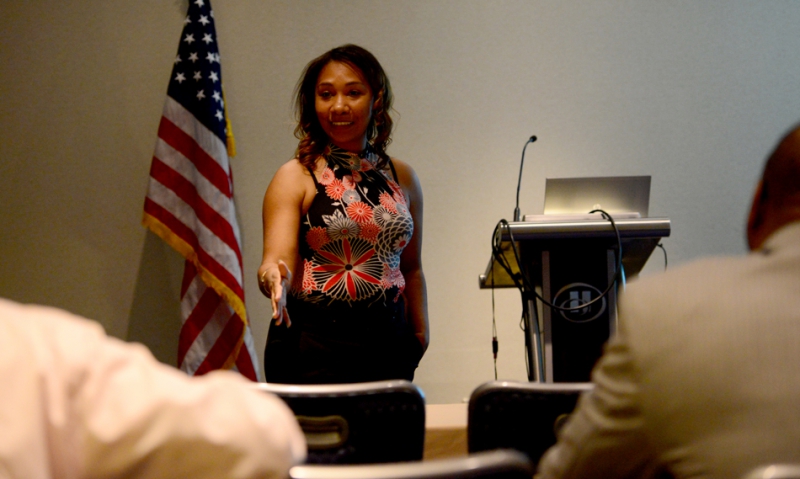
Citibank conducts résumé workshop for vets
Army veteran Shanttel Stowers was surprised, even baffled, when Citibank – one of the nation’s largest financial institutions – offered her a job. “I can't even balance my own checkbook,” said Stowers, a former military logistician. “I couldn’t imagine why they would want me.”
Stowers has since learned why the financial giant sought her services, and she passed along this knowledge to job-seeking veterans during The American Legion's Résumé Writing Workshop on Thursday in Washington, which was sponsored by Citibank.
Stowers said her employment as a Citibank operations manager was the result of a 15-minute conversation with one of the corporation’s recruiters who viewed her military experience in a different light than she expected. What Citibank valued in her informal job interview and on her résumé, said Stowers, was not a military-specific skill set but the general skills she had utilized to perform her Army duties.
“When you write a military operations order, for instance, you’re actually acting as a project manager," she said. "In fact, when you think about it, everyone in the military has been a project, program or operations manager. That’s what companies are looking for and that’s how you should think of yourself.”
With that philosophy in mind, during the résumé writing workshop Stowers passed along a number of specific tips on how to make a positive impression on civilian human resources professionals.
“Get your accomplishments up front in a concise summary right at the beginning of the resume,” she said, emphasizing that on paper a job seeker “has about 10 to 15 seconds to capture attention and make the (résumé reviewer) read on.” The up-front summary, according to Stowers, should emphasize experience first. “Fifteen years’ experience managing an operational unit makes a powerful statement and experience can often trump education.”
Stowers also advised job seekers to keep their résumé short and to the point. "One page containing the summary of accomplishments, short review of professional experience and list of educational credentials is all that is needed," she said “Recruiters who might have to review 500 résumé for one position don’t have the time to read a 10-page story of your life.” She also said that a résumé containing short bullet points is favored by many reviewers. “Personally, I really like bullet points,” she said.
Stowers also said that it is wise to prepare more than one résumé, each version primarily emphasizing accomplishments important to a particular industry or would-be employer.
The Citibank employer counselor told attendees at the résumé writing workshop to be prepared to answer a set of industry standard “STAR” questions along the lines of:
-
S - What was a SITUATION in which you had to meet a possibly difficult challenge?
-
T – What was the TASK?
-
A – What ACTION did you take?
-
R – What was the RESULT?
“Don’t tell a recruiter that you have never had any trouble solving a problem, especially a tough one,” Stowers said. “They want to know that you can overcome difficulties and produce a positive result. Besides, they won’t believe you.”
Social media is an important candidate screening resource these days, Stowers said. “(Recruiters) will Google you so be smart about what you put on your LinkedIn and Facebook pages.” She said that one's social media pages will be scrutinized to confirm the claims made on a résumé and job application. Social media postings will also be viewed to gauge character and behavior. “Don’t be dumb and look dumb,” said Stowers.
Stowers promoted online resources and industry programs designed to aid military veterans in finding civilian employment. One that she mentioned repeatedly is the Vocational Rehabilitation and Employment website maintained by the Department of Veterans Affairs. Another is the Joint Knowledge Online website administered by the Department of Defense (DoD). This site is accessible only to those servicemembers and veterans possessing a DoD Common Access Card (CAC), “so it’s important to keep your JKO card current,” said Stowers.
Throughout the résumé writing workshop, which drew more than a dozen serious job seekers, Stowers painted a generally positive picture of prospects for veterans seeking civilian employment, saying that private industry as well as the public sector recognizes the worth of military experience and the positive characteristics common among veterans.
“They (employers) don’t care as much as you think” about experience or education that relates directly to job descriptions, she said, but are more impressed by demonstrated leadership qualities, adaptive skills and problem solving abilities.
“If they think you are a worthwhile candidate, they will train you for that job.”
